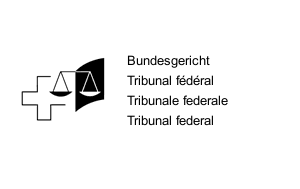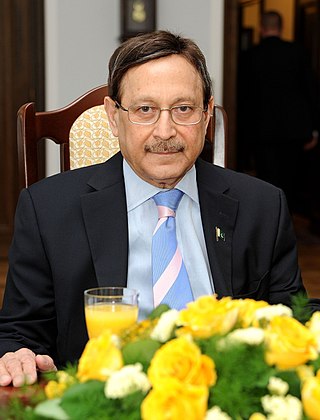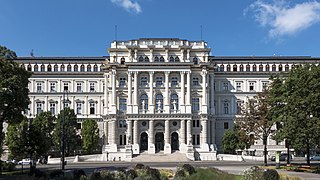Related Research Articles

Roland Freisler, was a German jurist, judge and politician who served as the State Secretary of the Reich Ministry of Justice from 1934 to 1942 and as President of the People's Court from 1942 to 1945.
An inquisitorial system is a legal system in which the court, or a part of the court, is actively involved in investigating the facts of the case. This is distinct from an adversarial system, in which the role of the court is primarily that of an impartial referee between the prosecution and the defense. Inquisitorial systems are used primarily in countries with civil legal systems, such as France and Italy, or legal systems based on Islamic law like Saudi Arabia, rather than in common law systems. It is the prevalent legal system in Continental Europe, Latin America, African countries not formerly under British rule, East Asia, Indochina, Thailand, and Indonesia. Most countries with an inquisitorial system also have some form of civil code as their main source of law.

The Federal Court of Justice is the highest court of civil and criminal jurisdiction in Germany. Its primary responsibility is the final appellate review of decisions by lower courts for errors of law. While, legally, a decision by the Federal Court of Justice is only binding with respect to the individual case in which it enters, de facto the court's interpretation of the law is followed by lower courts with almost no exception. Decisions handed down by the Federal Court of Justice can only be vacated by the Federal Constitutional Court for violating a provision of the German constitution, the Basic Law.

The Federal Supreme Court of Switzerland is the supreme court of the Swiss Confederation and at the head of the Swiss judiciary.
The German Democratic Republic was created as a socialist republic on 7 October 1949 and began to institute a government based on the government of the Soviet Union during the Stalin era. The equivalent of the Communist Party in East Germany was the Sozialistische Einheitspartei Deutschlands, which along with other parties, was part of the National Front of Democratic Germany. It was created in 1946 through the merger of the Communist Party of Germany (KPD) and the Social Democratic Party of Germany (SPD) in the Soviet Occupation Zone of Germany. Following German reunification, the SED was renamed the Party of Democratic Socialism (PDS), which eventually merged with the West German Electoral Alternative for Labor and Social Justice to form the modern Left Party.
The Netherlands uses civil law. The role of case law is small in theory, although in practice it is impossible to understand the law in many fields without also taking into account the relevant case law. The Dutch system of law is based on the French Civil Code with influences from Roman Law and traditional Dutch customary law. The new civil law books were heavily influenced by the German Bürgerliches Gesetzbuch.

Adolf Arndt was a German politician of the Social Democratic Party (SPD) and former member of the German Bundestag.
The government of Hamburg is divided into executive, legislative and judicial branches. Hamburg is a city-state and municipality, and thus its governance deals with several details of both state and local community politics. It takes place in two ranks – a citywide and state administration, and a local rank for the boroughs. The head of the city-state's government is the First Mayor and President of the Senate. A ministry is called Behörde (office) and a state minister is a Senator in Hamburg. The legislature is the state parliament, called Hamburgische Bürgerschaft, and the judicial branch is composed of the state supreme court and other courts. The seat of the government is Hamburg Rathaus. The President of the Hamburg Parliament is the highest official person of the Free and Hanseatic City of Hamburg. This is a traditional difference to the other German states. The president is not allowed to exert any occupation of the executive.

The judiciary of Austria is the system of courts, prosecution and correction of the Republic of Austria as well as the branch of government responsible for upholding the rule of law and administering justice. The judiciary is independent of the other two branches of government and is committed to guaranteeing fair trials and equality before the law. It has broad and effective powers of judicial review.

Farooq Hamid Naek also spelled Farooq H. Naik, is a Pakistani politician and lawyer, who served as the Chairman Senate, Minister of Law as well as headed the Ministry of Justice in the government led by Prime Minister Yousaf Raza Gillani.

Franz Eduard Ritter von Liszt was a German jurist, criminologist and international law reformer. As a legal scholar, he was a proponent of the modern sociological and historical school of law. From 1898 until 1917, he was Professor of Criminal Law and International Law at the University of Berlin and was also a member of the Progressive People's Party in the Prussian Chamber of Deputies and the Reichstag.
Curt Walter Joël was a German jurist and civil servant. He was the senior civil servant in the Ministry of Justice for much of the 1920s and early 1930s, during the Weimar Republic era. Joël also served as acting Minister of Justice and in 1931/32 was a member of Heinrich Brüning's second cabinet.

Eric Andreas Hilgendorf is a German professor of law and legal philosopher. He holds the Chair in Criminal Law, Criminal Procedure, Legal Theory, and Information and Computer Science Law at the University of Würzburg. Hilgendorf is one of Germany's most influential scholars in the field of criminal law, with special focuses on IT law as well as on artificial intelligence and law.

The Supreme Court of Justice is the final court of appeal of Austria in civil and criminal matters. Along with the Supreme Administrative Court and the Constitutional Court, it is one of Austria's three apex courts.
Otto Bähr was a German legal scholar and liberal parliamentarian.

Karl Engisch was a German jurist and a Philosopher of Law. He was described by Hans Joachim Hirsch as one of the "outstanding theorists of criminal justice of the [twentieth] century".
The German Law on the Protection of Trade Secrets, or Trade Secrets Law in short, serves to protect business secrets against unauthorized acquisition, use, and disclosure. The law implements the Directive (EU) 2016/943 on the Protection of Trade Secrets in German law. It replaces the right to secrecy, which was previously regulated in §§ 17-19 of the Act Against Unfair Competition.
Reinhard Frank was a German lawyer-academic specialising in criminal law and international public law. He was a prolific author of legal text books and became an influential law reformer. In 1920 Frank was appointed Rector of Munich University.

Hermann Karl August Weinkauff was a German jurist. He served in several positions as a judge and later became the first President of the Federal Court of Justice of West Germany.
Gerd Pfeiffer was a German jurist who served as the fourth President of the Federal Court of Justice of West Germany from 1977 to 1987.
References
- 1 2 3 4 5 6 7 8 9 10 11 12 13 14 Henrik Eberle. "Fritz Hartung". Archiv der Martin-Luther-Universität Halle-Wittenberg. Retrieved 3 July 2021.
- 1 2 3 4 5 6 "Reichsgerichtsrat a. D. Dr. jur. h.c. Fritz Hartung: Begründer der Schiedsmannszeitung und Mitbegründer des Bundes Deutscher Schiedsmänner: geb. 4. 4. 1884 gest. 14. 5. 1973" (PDF). Nachruf!. Carl Heymanns Verlag KG & Bund Deutscher Schiedsmänner und Schiedsfrauen e.V. (SchiedsamtsZeitung: Online-Archiv ), Bochum. 1973. pp. 113–114. Retrieved 3 July 2021.
- ↑ Warren Rosenblum (2008). The end of justice? .... Restoring trust: Make justice social?. p. 177. ISBN 978-0-8078-3204-2.
{{cite book}}:|work=ignored (help) - ↑ Gerhard Köbler (compiler) (2014). Dokumentation von Beiträgen einer Tagung .... an der Universität Augsburg. ISBN 978-3-16-154148-3 . Retrieved 4 July 2021.
{{cite book}}:|work=ignored (help) - ↑ Paul Aschaffenburg (1925). "97-98, Ernst Schäfer und Fritz Hartung. Strafrecht und Strafprozeß. Teil I: Strafrecht. 1924". synopsis-review .... Monatsschrift für Kriminalpsychologie und Strafrechtsreform. Stiftung Preußischer Kulturbesitz, Berlin & Eberhard Karls Universität (Universitätsbibliothek) Tübingen. Retrieved 5 July 2021.
- ↑ SchiedsamtsZeitung (SchAZtg) Bd. 44 (1973), p. 113
- ↑
- Helmut Klaere. "Die Abschaffung der echten Schwurgerichte in der Weimarer Republik". Jogelméleti Szemle. ISSN 1588-080X . Retrieved 5 July 2021.
- ↑ Klaus-Detlev Godau-Schüttke: Der Bundesgerichtshof – Justiz in Deutschland -, Berlin 2005, p. 49.
- ↑ Klaus-Detlev Godau-Schüttke (6 June 2001). "Von der Entnazifizierung zur Renazifizierung der Justiz in Westdeutschland". Forum Historiae Iuris. Eberhard Karls Universität Tübingen: Juristische Fakultät. ISSN 1860-5605 . Retrieved 5 July 2021.
- ↑ Fritz Hartung (1971). Jurist unter vier Reichen. Carl Heymanns Verlag, Cologne. p. 123. ISBN 9783452172167.
- ↑ Klaus-Detlev Godau-Schüttke (July 1995). "Personelle und inhaltliche Kontinuitäten: Folgen der gescheiterten Entnazifizierung der Justiz". Informationen der Schlewig-Holsteinischen Zeitgeschichte (Kiel). Arbeitskreis zur Erforschung des Nationalsozialismus in Schleswig-Holstein e.V. (AKENS), Hitzacker. pp. 3–19. Retrieved 5 July 2021.
- 1 2 Fritz Hartung: „Der „Badewannenfall“. Eine Reminiszenz“, in: Juristenzeitung 1954, p. 430
- 1 2 3 Steffen Lux in Raum und Zeit (compiler-reporter). "Täterschaft und Teilnahme". Strafrecht. Retrieved 6 July 2021.
- ↑ Eike Wolgast (2006). Mittlere und Neuere Geschichte. pp. 491–516. ISBN 978-3-540-39385-6.
{{cite book}}:|work=ignored (help) - ↑ „Schlägermensur und Strafrecht“, Juristenzeitung 1954, p. 369.
- ↑ "Deutscher Bundestag 39. Sitzung Bonn, Mittwoch, den 18. März 1970" (PDF). Deutscher Bundestag, Berlin. Retrieved 6 July 2021.